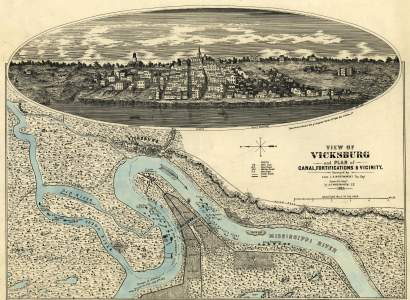Vicksburg, Mississippi (Hayward)
Gazetteer/Almanac
Vicksburg, Mi., Warren co. Situated on the E. bank of the Mississippi. 50 miles N. N. E. from Natchez, and about 45 W. from Jackson, the capital of the state, with which it is connected by a railroad. The town is on a high bluff, about 200 feet above the river. The scenery is very fine from the bluffs in this neighborhood. The Walnut Hills, a little above Vicksburg, rise boldly, with alternate swells and gullies, to the height of nearly 500 feet, and form one of the most striking views met with by the traveler on the Lower Mississippi. This town has 4 or 5 churches, 2 of which, the Methodist and the Roman Catholic, are fine structures, several private schools, and 1 public school supported by special tax, containing about 500 scholars. An active business is done here in the preparation of lumber and building materials by saw mills, shingle factories, and brick yards. About 90,000 bales of cotton are annually shipped from this place to New Orleans.
John Hayward, Gazetteer of the United States of America… (Philadelphia: James L. Gihon, 1854), 606.










